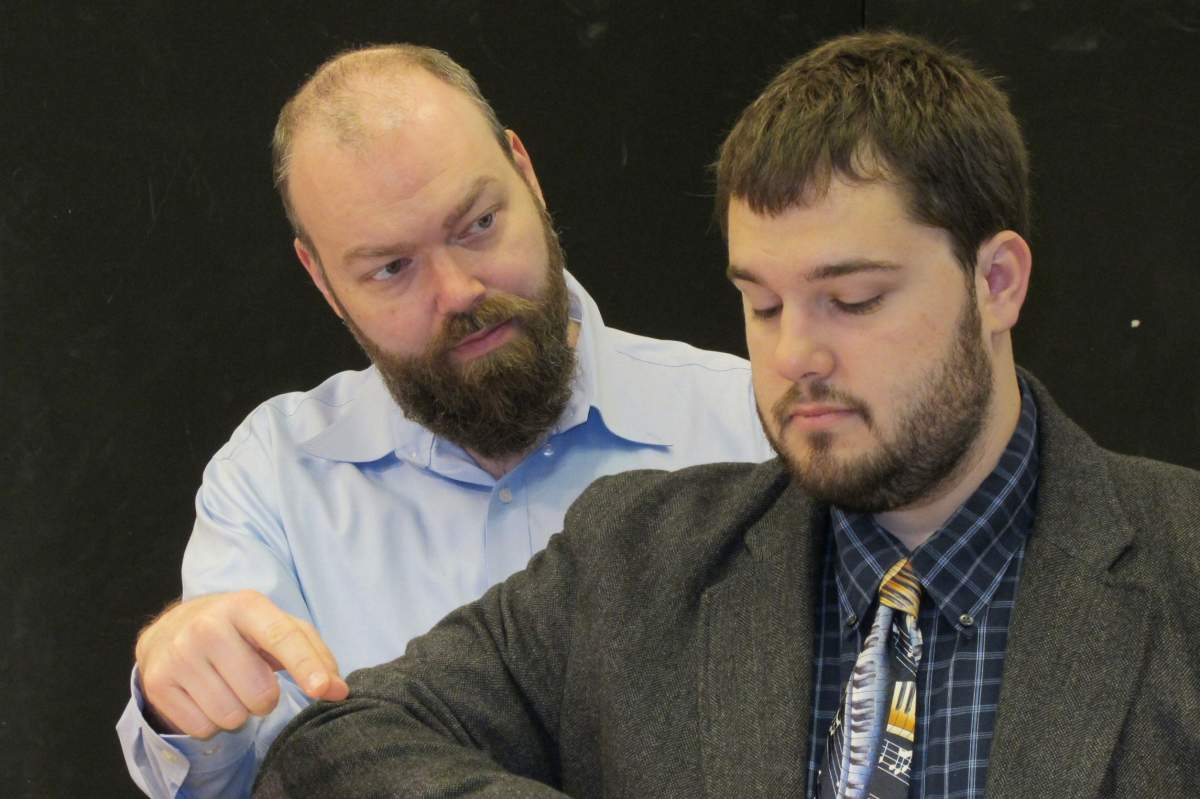
Old Wicked Songs in the Jewish Theatre of Bloomington's production Jon Maran's thought provoking, warmly funny story of a young man who's reluctantly looking for wisdom and an old man who has wisdom, but problems of his own.
John Stender is the young man, Stephan Hoffman. At twenty-five, Stephan is a burned out piano prodigy. His career was built on mimicking other artists not on an internal connection with the music. His hollow success as a soloist has simply fallen in on itself. In confusion and defeat, Stephan has come to Vienna to learn to be an accompanist.
Ray Fellman plays his professor, Josef Mashkan. Mashkan is a deeply committed and insightful musician. He has the task of forcing the reluctant Stephan to actually learn to sing some of the music that he'll be learning to accompany. Mashkan also has some problems. He's is a bit of an outsider a whimsical pedagogue. He does have a disquieting habit of occasionally trying to commit suicide. There's a good deal of humor in their scenes.
The piece that Mashkan has chosen for Stephan is Robert Schumann's bitter sweet song cycle "The Poet's Love,' Dichterliebe. The recurring message is a curious one of philosophical resignation, "I bear no grudge, though my heart is broken." Some of the most fascinating scenes of Old Wicked Songs are the phrase by phrase master classes that the professor puts Stephan through. Coming to grips with the emotional depth of these songs is the beginning for Stephan's reconnection with the heart of music. Playwright Jon Marans has wrapped the songs into the structure of the play. The actors' playing and singing during the lessons neatly fades into and out of recordings.
Along with the story of Stephan's reconnection with music is his acknowledgement of his own Jewish back ground. When he first comes to Professor Mashkan, he claims to be a Protestant. Later he visits the site of the concentration camp at Dachau and his anger at the experience forces him to acknowledge his own Jewish connection. With the philosophy of Heine's poetry from the Dichterliebe and Mashkan's own example, Stephan is able to come to a more mature understanding of his emotions and history.
Both of the actor musicians have deep backgrounds in music and in theatre. Ray Fellman has a long background in opera and musical theatre. He's currently on the faculty of the IU Department of Theatre, Drama and Dance. John Stender has acted and sung in productions. He's currently a graduate student focusing on the organ in the Jacobs School of Music. Both handle the musical challenges with grace. Stender is especially effective as a fledgling singer, so caught up in Schumann's text that he is able to both feel and express the powerful emotions.
Director Mark Kamie, back for his third Jewish Theatre production has done skillful blockings of this two character story that always seem to flow naturally and easily. David Wade's richly detailed set is very much an active part of the play. Stephan derides the dark wood, the tchochkes on every surface, the overstuffed furniture and the dark wood. The Professor finds all of it comforting.






